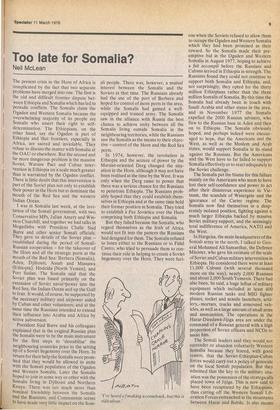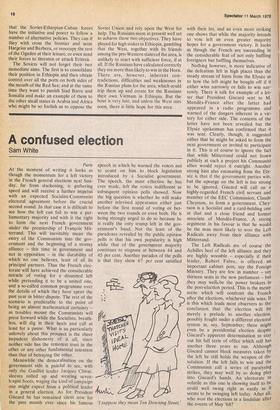Too late for Somalia?
Neil McLean
The present crisis in the Horn of Africa is complicated by the fact that two separate problems have merged into one. The first is the old and difficult frontier dispute between Ethiopia and Somalia which has led to periodic conflicts. The Somalis claim the Ogaden and Western Somalia because the overwhelming majority of its people are Somalis who assert their right to selfdetermination. The Ethiopians, on the other hand, say the Ogaden is part of Ethiopia and that frontiers, especially in Africa, are sacred and inviolable. They refuse to discuss the matter with Somalia at the OAU or elsewhere. But the second and far more dangerous problem is the massive Soviet, Warsaw Pact and Cuban intervention in Ethiopia on a scale much greater than is warranted by the Ogaden conflict. There is little doubt that this intervention is part of the Soviet plan not only to establish their power in the Horn but to dominate the mouth of the Red Sea and the western Indian Ocean.
I was in Somalia last week, at the invitation of the Somali government, with two Conservative MPs, Julian Amery and Winston Churchill, and together we had talks in Mogadishu with President Challe Siad Barre and other senior Somali officials. They gave us details of the Soviet plan — established during the period of SomaliRussian cooperation — for the takeover of the Horn and all the strategic ports at the Mouth of the Red Sea: Berbera (Somalia), Aden, Djibouti, Assab and Massawa (Ethiopia), Hodeida (North Yemen), and Port Sudan. The Somalis said that the Soviet plan was based primarily on the extension of Soviet naval 'power into the Red Sea, the Indian Ocean and up the Gulf to Iran. It would, of course, be supported by the necessary military and airpower aided by Cuban and other volunteers; and at the same time the Russians intended to extend their influence into Arabia and Africa by active subversion.
President Siad Barre and his colleagues explained that in the original Russian plan the Somalis were to be the main instrument for the first steps to 'destabilise' the neighbouring countries prior to the setting Up of a Soviet hegemony over the Horn. In return for their help the Somalis were promised that they would be allowed to unite With the Somali population of the Ogaden and Western Somalia. Later the Somalis hoped to join in some way or other with the Somalis living in Djibouti and Northern Kenya. There was not much more than nominal friendship between the Somalis and the Russians, and Communism seems to have made very little impact on the Som ali people. There was, however, a mutual interest between the Somalis and the Soviets at that time. The Russians already had the use of the port of Berbera and hoped for control of more ports in the area, while the Somalis had gained a wellequipped and trained army. The Somalis saw in the alliance with Russia the best chance to achieve unity between all the Somalis living outside Somalia in the neighbouring territories, while the Russians saw the Somalis as the means to their objective — control of the Horn and the Red Sea ports.
In 1974, however, the revolution in Ethiopia and the seizure of power by the Marxist-oriented Derg changed the situation in the Horn, although it may not have been realised at the time by the West. It was only when the Derg came to power that there was a serious chance for the Russians to penetrate Ethiopia. The Russians probably hoped that they could establish themselves in Ethiopia and at the same time hold their former position in Somalia. They tried to establish a Pax Sovietica over the Horn comprising both Ethiopia and Somalia.
But they failed because the Somalis, who regard themselves as the Irish of Africa, would not fit into the pattern the Russians had designed for them. The Somalis refused to listen either to the Russians or to Fidel Castro, who tried to persuade them to continue their role in helping to create a Soviet hegemony over the Horn. They were fun
ous when the Soviets refused to allow them to occupy the Ogaden and Western Somalia which they had been promised as their reward. So the Somalis made their preemptive . bid in the Ogaden and Western Somalia in August 1977, hoping to achieve a fait accompli before the Russians and Cubans arrived in Ethiopia in strength. The Russians found they could not continue to support both Somalia and Ethiopia, and, not surprisingly, they opted for the thirty million Ethiopians rather than the three million Somalis of Somalia. By this time the Somalis had already been in touch with Saudi Arabia and other states in the area, and in November 1977 the Somalis expelled the 2000 Russian advisers, who flew to the Russian base in Aden and then on to Ethiopia. The Somalis obviously hoped, and perhaps indeed were encouraged to hope, that the Americans and the West, as well as the Moslem and Arab states, would support Somalia in its stand against the Russians. But the Americans and the West have so far failed to support Somalia effectively or to react adequately to the Soviet challenge.
The Somalis put the blame for this failure mainly on the Americans who seem to have lost their self-confidence and power to act after their disastrous experience in Vietnam, the scandals of Watergate and the ignorance of the Carter regime. The Somalis now find themselves in a desperately isolated position, fighting against a much larger Ethiopia backed by massive Soviet military support, and the seemingly total indifference of America, NATO and the West.
In Hargeisa, the main headquarters of the Somali army in the north, I talked to General Mohamed All Samanthar, the Defence Minister, who gave his estimate of the scale of Soviet and Cuban military intervention in Ethiopia. He considered there were at least 11,000 Cubans (with several thousand more on the way), nearly 2,000 Russians and about 2,000 South Yemenis. There had also been, he said, a huge influx of military equipment which included at least 400 modern Russian tanks and MIG fighter planes, rocket and missile launchers, artillery,mortars, trucks and armoured vehicles, as well as a large amount of small arms and ammunition. The operations in the Harar-Diredawa-Jijiga area are under the command of a Russian general with a high proportion of Soviet officers and NCOs to assist him.
The Somali leaders said they wouldsnot surrender or abandon voluntarily Western Somalia because they feared, with good reason, that the Soviet-Ethiopian-Cuban forces would carry out a policy of genocide on the local Somali population. But they admitted that the key to the military situation was the possession of the strategically placed town of Jijiga. This is now said to have been recaptured by the Ethiopians, thus cutting off the Western Somali Liberation Forces entrenched in the mountains between Harar and Babile. It also means
that the Soviet-Ethiopian-Cuban forces have the initiative and power to follow a number of alternative policies. They can if they wish cross the frontier and seize Hargeisa and Berbera, or reoccupy the rest of the Ogaden at their leisure, or even send their forces to threaten or attack Eritrea.
The Soviets will not forget their two immediate aims. The first is to consolidate their position in Ethiopia and then obtain control over all the ports on both sides of the mouth of the Red Sea; and at the same time they want to punish Siad Barre and Somalia and make an example of them to the other small states in Arabia and Africa who, might be so foolish as to oppose the Soviet Union and rely upon the West for help. The Russians seem at present well set to achieve these two objectives. They have played for high stakes in Ethiopia, gambling that the West, together with its friends among the pro-Western states of the area, is unlikely to react with sufficient force, if at all. If the Russians have calculated correctly they are more than likely to win in the Horn. There are, however, inherent contradictions, difficulties and weaknesses in the Russian plans for the area, which could trip them up and create for the Russians their own Vietnam in Ethiopia. But the hour is very late, and unless the West stirs soon, there i little hope for this area.



































 Previous page
Previous page